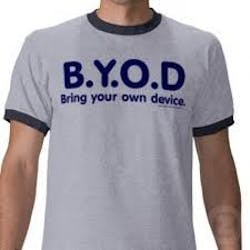First-Hand Experience with BYOD in Manufacturing
As I stated when I developed the first article on BYOD (bring your own device) for Automation World, I did not think at the time that it would be a core issue for many of our readers. However, subsequent discussions on the Automation World LinkedIn group showed that it has already developed into a touchy issue for many readers.
Then I received a letter from a reader who shared his first-hand experience as an engineer moving from a company that did not have BYOD policy to one that does. Because he shared quite a bit of detail about the companies’ policies, the reader asked to remain anonymous. Here’s what he had to say about his BYOD experience:
“This year, I transitioned from an engineering management position within a manufacturing division of Sony Corp. to a similar position at a Tier 1 automotive supplier. I can speak to both sides of the BYOD article.
“At Sony, intellectual property security was extreme (full body scans when leaving buildings, no USB ports active on laptops, no cloud connectivity of devices, etc.) and therefore no personal electronic devices of any type were allowed in the work environment. A personal phone, iPod, tablet, or even a GPS would be confiscated and scanned for verification that no media of any sort was being pirated, stolen, or 'consumed'. The devices I needed for work (laptop, tablet and smartphone) were formatted specifically by the IT department, paid for completely by the company, and tagged with a security hologram to serialize them uniquely to me as the sole user. This was completely fine for me, I adapted easily to the policy, had a new set of devices furnished each year, unlimited voice, text and data, and most importantly no concern of international roaming. It worked for me and the company. I approved the invoices each month for the wireless device fees and the corporate plan was very low cost for that much service. My total bill each month never exceeded $120.
“After the career path change, I experienced the BYOD culture change. The company I came to covers only $40/month of a wireless bill and supplies a laptop only. So the investment in a smartphone was up to me, [choosing a] plan became my responsibility (including international roaming, which is a significantly high cost), and while the tablet offers very real efficiency advantages while working remotely the cost is 100 percent up to me (both the device and monthly fees). While there are some small (extremely insignificant) advantages to minimal or no IT governance of the devices I use, there really is no advantage to the employee in this system. My bill for comparable devices that I used at Sony is $160/month, so certainly my buying power is less as an individual. In my case however, the company is covering a very minimal portion ($40 is just the smartphone cost per month with Verizon on a 'share everything' plan) and is money ahead by minimizing the IT involvement/governance due to lower security protocols. For this company, but not for this employee, BYOD is saving money. I am very pleased with my new job and am confident I made the best choice for my future and my family, but I did prefer the company furnished devices and did not mind the security lock down of what devices were furnished.”
Clearly the BYOD issue is an ongoing and developing one for the manufacturing industries. If you have a BYOD experience you'd like to share, let us know. It could help impact the future direction of BYOD in manufacturing.


